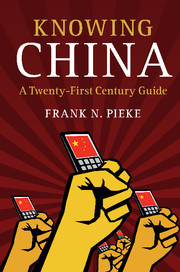Book contents
- Frontmatter
- Dedication
- Contents
- Preface
- Main Events in China, 1976–2015
- 1 Introduction: Knowing China
- 2 Why the Communist Party Will Not Fall from Power
- 3 China's Economy Will Continue to Grow, but Not Forever
- 4 Freedom without Universal Human Rights
- 5 From Empire to Nation, or Why Taiwan, Tibet and Xinjiang Will Not Be Given Independence
- 6 Not Just a Chinese Century
- 7 Conclusion: The Communist Party and China's Future
- Further Reading
- References
- Index
5 - From Empire to Nation, or Why Taiwan, Tibet and Xinjiang Will Not Be Given Independence
Published online by Cambridge University Press: 05 July 2016
- Frontmatter
- Dedication
- Contents
- Preface
- Main Events in China, 1976–2015
- 1 Introduction: Knowing China
- 2 Why the Communist Party Will Not Fall from Power
- 3 China's Economy Will Continue to Grow, but Not Forever
- 4 Freedom without Universal Human Rights
- 5 From Empire to Nation, or Why Taiwan, Tibet and Xinjiang Will Not Be Given Independence
- 6 Not Just a Chinese Century
- 7 Conclusion: The Communist Party and China's Future
- Further Reading
- References
- Index
Summary
To the Communist Party, socialist emancipation and national salvation have always been inseparable. The CCP is heir to a tradition of reform and revolution going back to China's defeat during the First Opium War in 1842. Since then, the concern of countless officials, scholars, students, rebels, activists, writers, scientists and revolutionaries was to ‘save the nation’ and to overcome the ignominy of ‘national humiliation’ at the hands of Western and Japanese imperialist aggression. The years immediately after the fall of the Qing dynasty in 1912 in particular were times of rapid radicalization. Appalled by the swift deterioration of the new Republic that succeeded the Empire, patriots trawled Western ideas in search of possible solutions to the country's dire condition, among which Marxism initially was only one. In fact, many of the earliest members of the Communist Party turned to communism only after the success of the Bolshevik Revolution in 1917 showed how powerful a communist nation could suddenly become in a country like Russia which was only a little less poor and backward than their own.
One hundred years on, China as a nation is still very much a work in progress, a project to turn the conquest empire of the Qing dynasty into a modern country and a united nation. In the reform period the relative importance of nation building has increased to the point that nowadays little is heard of a communist utopia. There are three core concepts at the heart of the Communists’ national project: the country of the People's Republic of China, the Chinese nation and the Han people. In this chapter I will describe how the CCP brings its neo-socialist arsenal to bear on each of these, enabling it to go far beyond the very real progress made under Mao. China is on its way to becoming a modern and integrated society in which there is paradoxically more and at the same time less space for and tolerance of any form of diversity that challenges the unity of the country, the nation or the people.
- Type
- Chapter
- Information
- Knowing ChinaA Twenty-First Century Guide, pp. 121 - 143Publisher: Cambridge University PressPrint publication year: 2016



